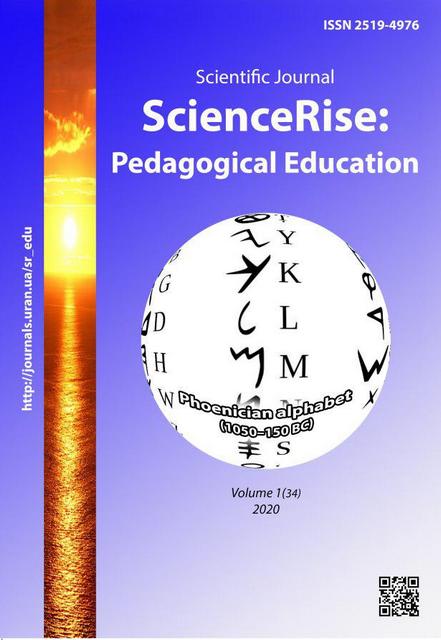Innovative methodological model of instrumental preparation of future teachers of musical art in the aspect of development of their performing independence
DOI:
https://doi.org/10.15587/2519-4984.2020.193401Keywords:
performing independence, innovative methodical model, instrumental training, music art teachersAbstract
The development of performing independence of future teachers of musical art as non-innate but acquired integral property of a personality is considered, which contributes to a high level of reproducing the necessary information, based on the creative embodiment of the original interpretational model of musical works into the process of instrumental activity. The developed methodological bases of its four-phase development are offered.
The first phase is characterized by the direction of students' efforts to establish the internal organization of the motives and impulses of the will to realize incentive actions for obtaining objective information about the real assessment of the stage-interpretative complexity of musical works in the course of familiarization with the general features of their textual and performing components.
The second phase involves activating the aspirations of students to give priority to procedural motivation, which contributes to the maximum depth in the process of awareness of musical information, the integration and automation of play movements in order to concretize the features of the interpretation model of musical works.
In the third phase, priority is given to encouraging students to maintain the attractiveness of the installations during their rehearsal realization, and in the fourth – their orientation to consolidate the achieved executive autonomy by emotionality of the conditions of stage activity.
The introduction of an appropriate innovative methodological model in the system of instrumental training of future teachers of music arts, will help to resolve the issues of optimization of vocational training directions, stimulating self-employment, which undoubtedly influences the formation of demotivating indicators for reducing labor migration from Ukraine
References
- Cypin, G. M. (1984). Obuchenie igre na fortepiano. Moscow: Enlightenment, 173.
- Tsagarelli, Yu. A. (1989). Psihologiya muzyikalno-ispolnitelskoy deyatelnosti. Kazan, 425.
- Yunik, T. I. (1996). Udoskonalennia metodyky zapamiatovuvannia muzychnoho tekstu yak zasib rozvytku vykonavskoi maisternosti studentiv- pianistiv (na materiali pedvuziv). Kyiv, 238.
- Yunyk, D. G. (2009). Vykonavska nadiinist muzykantiv: zmist, struktura i metodyka formuvannia. Kyiv: DAKKKiM, 338.
- Elliottm, D. J. Musical Creativity (Comments to Praxial Music). Available at: http://www.davidelliottmusic.com/praxial-music-education/musical-creativity/
- Kotova, L. M. (2000). Emotsiina stiikist yak zasib formuvannia instrumentalno-vykonaskoi nadiinosti u studentiv muzychno-pedahohichnykh fakultetiv. Melitopol, 260.
- Shchapov, A. P. (1968). Nekotorye voprosy fortepiannoi tekhniki. Moscow: Music, 216.
- Burnazova, V. V. (2010). Metodychni zasady rozvytku vykonavskoi samostiinosti studentiv muzychno-pedahohichnykh fakultetiv u protsesi instrumentalnoi pidhotovky. Berdyansk, 235.
- Margulis, E. H. (2012). Musical Repetition Detection Across Multiple Exposures. Music Perception: An Interdisciplinary Journal, 29 (4), 377–385. doi: http://doi.org/10.1525/mp.2012.29.4.377
- Burnazova, V. V. (2012). Vykonavska samostiinist muzykantiv-instrumentalistiv: zmist, struktura i metodyka rozvytku. Berdyansk: Publisher of BSPU, 187.
Downloads
Published
How to Cite
Issue
Section
License
Copyright (c) 2020 Vira Burnazova

This work is licensed under a Creative Commons Attribution 4.0 International License.
Our journal abides by the Creative Commons CC BY copyright rights and permissions for open access journals.
Authors, who are published in this journal, agree to the following conditions:
1. The authors reserve the right to authorship of the work and pass the first publication right of this work to the journal under the terms of a Creative Commons CC BY, which allows others to freely distribute the published research with the obligatory reference to the authors of the original work and the first publication of the work in this journal.
2. The authors have the right to conclude separate supplement agreements that relate to non-exclusive work distribution in the form in which it has been published by the journal (for example, to upload the work to the online storage of the journal or publish it as part of a monograph), provided that the reference to the first publication of the work in this journal is included.







